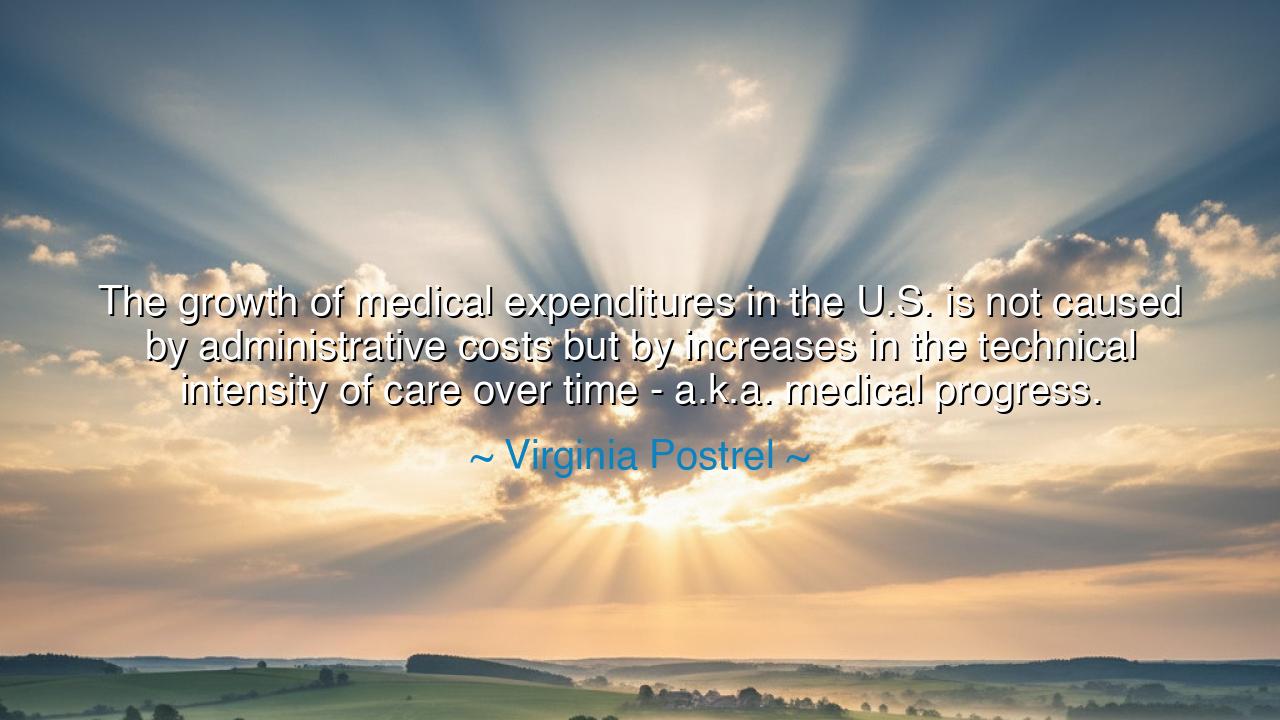
The growth of medical expenditures in the U.S. is not caused by
The growth of medical expenditures in the U.S. is not caused by administrative costs but by increases in the technical intensity of care over time - a.k.a. medical progress.






When Virginia Postrel wrote, “The growth of medical expenditures in the U.S. is not caused by administrative costs but by increases in the technical intensity of care over time — a.k.a. medical progress,” she was not merely speaking of numbers or budgets. She was describing the paradox of human advancement — that the very progress which saves lives also deepens the burden of cost. Her words carry the weight of an ancient truth: that every gain demands a price, and every step forward in knowledge reshapes the balance between what we value and what we can afford. In this, Postrel reminds us that medical progress is both miracle and mirror — a reflection of humanity’s triumph over nature and its struggle to sustain the fruits of that triumph.
To understand her meaning, one must see that medicine, like all crafts of civilization, is a living story of invention. In ancient times, healers had only herbs and faith; the wounded often prayed more than they were treated. But as centuries passed, the art of healing became a science of precision. Each discovery — the microscope, anesthesia, the germ theory, antibiotics, imaging, and surgery guided by computers — has carried humanity further from suffering, yet closer to complexity. Every new tool, every new technique, has come with its own technical intensity, its own intricate web of training, equipment, and systems. What Postrel calls the “growth of expenditures” is not waste — it is the cost of knowledge turned into salvation.
The origin of this truth lies in the very heart of human aspiration. We are a species that refuses to accept limitation. Where our ancestors once bowed before disease, we now confront it with machines that can peer into the cells of life itself. Yet, as our weapons against illness grow sharper, the price of wielding them grows heavier. A scan that once took hours now takes seconds — but it requires millions of dollars in technology. A child who once would have died in infancy now lives, but only through constant, costly care. Thus, medical progress becomes both a blessing and a burden, demanding that society wrestle not with failure, but with the consequences of its own success.
Consider the story of Jonas Salk, the man who created the polio vaccine. Before his work, countless children lay paralyzed or dead; after it, a generation rose unscarred. Yet, the victory of vaccines did not end the need for care — it expanded it. As diseases fell, lifespans lengthened, and with them came new ailments of age: cancer, heart disease, dementia. We cured death for the young, only to meet it again in the old. This is the cycle of progress Postrel reveals — that each triumph over nature creates new frontiers of challenge. The cost of medicine grows not because of failure, but because humanity’s reach continues to extend.
Her insight carries a deeper lesson about value and perspective. The ancients would have called it the law of balance — that every light casts a shadow. In the modern age, we measure progress by wealth and efficiency, yet medicine resists such measurement. A surgery that costs a fortune may give a father ten more years with his children; a new drug may spare a mother pain in her final days. What is the worth of such things? The ancients would say: the measure of life cannot be counted in coins, for the value of healing lies not in profit, but in mercy. And yet, mercy must be sustained by means. This is the tension Postrel’s words illuminate — that compassion and economics are forever entwined.
Still, there is a kind of heroism in this struggle. Each generation inherits a more powerful arsenal of care, but also a heavier responsibility. The healers of today are not mere practitioners — they are stewards of an empire of knowledge. They must wield it wisely, ensuring that the progress which raises humanity does not also divide it between those who can afford healing and those who cannot. The challenge is not to halt innovation, but to guide it with wisdom and justice, so that the miracles of medicine remain the common inheritance of all.
Thus, the lesson of Virginia Postrel’s quote is this: progress is never free, but it is always worth pursuing when guided by conscience. We must not curse the cost of medical advancement, for that cost is written in the language of our compassion and curiosity. Instead, we must seek balance — between innovation and access, between mastery and humility. Support science, but remember the soul; value care, but guard equity. For the ancients taught that the greatest physician heals not only the body, but the spirit of society itself.
Let her words, then, be remembered as both reminder and call to action: the price of progress is high, but the price of stagnation is higher. Let us embrace the power of our knowledge with gratitude, but wield it with responsibility. For in every new discovery, in every device and cure, we see not only the future of medicine but the reflection of what it means to be human — a creature forever reaching beyond its limits, striving not just to live longer, but to live better, with wisdom equal to its wonder.






AAdministratorAdministrator
Welcome, honored guests. Please leave a comment, we will respond soon